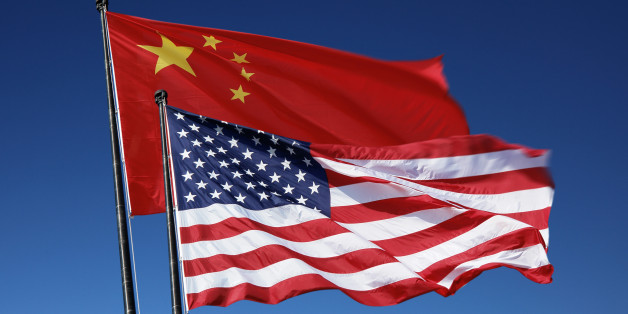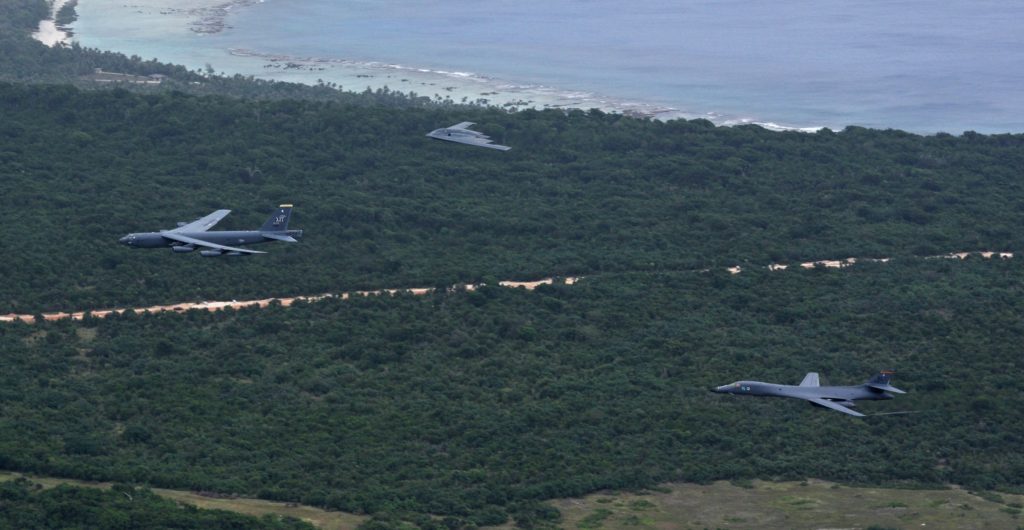
As the South China Sea dispute grows into what some could class as a cold war precursor between the States and China, the western media misrepresentations of the islands and UN ruling continue to add fuel to the burning embers.
“China and the U.S. are Approaching Dangerous Seas” reads the title of a Common Dreams article, and it isn’t just “rhetoric.”
The heated international spat between two super powers is an echo of the 1980s Cold War with no détente in sight. History may repeat itself, but politicians and media heed no warning. The continued propaganda machine of ‘The United States and UN is right, and China [insert every other nation] must be wrong’ is a deadly game that must be quelled before one nation steps over the line. It doesn’t matter who steps first, the end result will be the same.
Yes, China has built bases on the scattering of islands in the South China Sea. Yes, just recently, the United States has roped in their baby brother ally and deployed long-range nukes in Northern Australia, and also in Guam. And here lies the irony.
Guam*: A small island situated closer to Asia than the United States coast. So, why is Guam an American claim? Historical ties from World War II and a strategic “unsinkable aircraft carrier” for the military (initially against the Japanese).
*Consequentially, for those geographically challenged, Guam is situated on the other side of the Philippines, not too far from the disputed South China Sea. Hmmm.

In light of all this island grabbing, the Falkland Islands springs to mind; situated closer to Argentinean coastline rather than British. The then Prime Minister Margaret Thatcher, in 1982, happily deployed the military to defend the Crown land against Argentina, killing hundreds. Why? Historical ties and national pride. Wow.
It begs the question: If Britain was right in claiming the Falkland Islands, and the United States was right to claim Guam, why then, are the Chinese claims to the South China Sea Islands contentious?
What China Really Says…
According to China Daily, a hardcopy newspaper that landed in my possession, PLA Major General Peng Guangqian has a candid insight on the matter. Interviewed by Robert Kuhn, this report barely made it to the West.
Major General Peng stipulates that sovereignty and “core interests” are at the heart of the dispute on China’s part.
“It’s a reality that some of our islands and waters have been occupied by other countries and China’s resources have been plundered,” he said in the interview with Kuhn. “But we still advocate a peaceful settlement through negotiation and consultation,” insisting that China wants to discuss the concerns before the situation heats up.

General Major Peng cites historical relevance, which China stipulated time and again since 1949, as the core argument for why the South China Sea islands are Chinese territory. The nine-dash line, he admits, “looks imperialist,” but “this is our family property that we have earned; it is our heritage created by our ancestors,” he says referring to the battles against pirates, invaders and Mother Nature thousands of years ago.
In 1956, General Major Peng references Vietnam’s signing of an agreement stating they supported China’s claim to the Sea, which included coastlines and islands. Adding further, he mentions the countless treaties that the Philippines agreed to regarding the area and the east longitude 119. “Never did it [the treaties] say the area to the west of this boundary was its [Philippines] territory.”
What U.S. Secretary of Defense Ash Carter Says…
“Now make no mistake: The United States will fly, sail and operate wherever international law allows, as we do around the world, and the South China Sea is not and will not be an exception.”
Fairly straight forward?

However, according to General Major Peng, it is worth looking up what he calls the ‘free navigation plan,’ a U.S. implementation in 1979, pre UN Law of the Sea. (UN Law stipulates there are no international waters, hence, undermining the UN Court ruling which can only rule on economic etc., interests, not sovereign).
The free navigation plan, states Peng, is a means for the U.S. to mock UN law, using the example of recent U.S. B-52 bomber flyovers within 12 nautical miles of Chinese coastline.
“There are no ‘international waters,’ it is not a concept of the UN Law of the Sea nor is it a legal formality. It is coined by the U.S. for the purpose of ignoring the sovereignty of other countries.” The U.S. free navigation plan flies in the face of UN convention, ultimately undermining it.
Where to from Here?
Ask yourself this: If China were to fly a B-52 bomber within 12 nautical miles of the United States coastline, what do you think would happen?
The U.S. has deployed nuclear weaponry on Guam, in Australia, Hawaii and is relentless with Naval and Air presence in the Pacific region.
The Chinese government, with Peng as one of many spokesmen, has asked for quiet negotiations and agreement over the table.
Asked about Chinese military capabilities, Major General Peng was brutality honest in his response. “We will not make the first move,’ he says. “We will not use our power to bully others,” he hints at the west. Compared with the U.S. “then our naval force is definitely weaker.”
He hopes to avoid the “Thucydides Trap, where the rise of a new power usually ends up in war,” states journalist Kuhn.
“No one, except lunatics, would wage unlimited mutually fatal wars. I am confident that China and the U.S. will avoid the trap,” states Major General Peng.
However, one thing is made clear during the interview: “Only when there is no way out for us, will we be forced to do what we have to do.”
The mainstream media need to stop propagating myth and U.S. military ego.
Sources: Common Dreams, About Education, The Asia-Pacific Journal, China Daily (Hard Copy, August 12, 2016: pages 18-19), UN Convention on the Law of the Sea, Reuters, Huff Post, SF Gate.





Hey Bud.
Guam is a US Territory. The US won Puerto Rico, Guam, and the Philippines in the Spanish-American War. The Philippines was a US territory until the US granted it’s independence on July 4, 1946. Gen. MacArthur won it back from the Japanese in WWII, fulfilling the Promise of “I shall return.” The Philippines continued to be a military ally the 1990s, until there was massive peace and no major threat to US interests in the region, when the US withdrew from the Clark Air Force base (alt. landing strip for the Space Shuttle)and Subic Bay Naval Base (the largest overseas military installation of the United States Armed Forces after Clark Air Base). Quietly, under Obama — and with the regional support of S. Korea and Japan, the US for the 1st time deployed Stealth Bombers out of the country and reopened the bases due to massive recent Chinese aggression.
As stated in the article, Guam has historical ties to the U.S. as does the Sth China Sea to China – and there rests the parallel drawn between comparisons. Therefore, if the U.S. has the rights to claim territories under this pretext, so too, does any nation in the world. I guess the U.S. needs to follow its own lead from time to time…
Thanks for your comments.
Never listen to What the Communist said. Let Look at What have they been doing???
Please! Do not made any mistake to listening to the lIARS
We here at Anon. clearly publish all sides when possible. Let’s not shy away from the Communist view – it is as valid as that of the Capitalist view. If you prefer the other side to the story, visit: http://anonhq.com/ww-iii-approaching-china-strongly-warns-japan-joining-u-s-freedom-navigation-drills/
You’ll find the Japanese-U.S. viewpoints noted in Amando’s article. Don’t forget that EVERY ideology is true and valid to the one who holds it.
Thanks for the participation in comments.